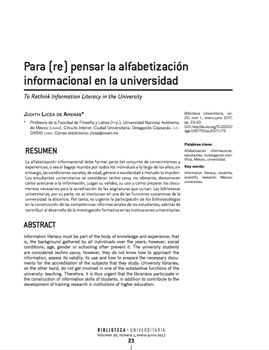Para (re) pensar la alfabetización informacional en la universidad
DOI:
https://doi.org/10.22201/dgb.0187750xp.2017.1.173Palabras clave:
Alfabetización informacional, estudiantes, investigación científica, México, universidad.Resumen
La alfabetización informacional debe formar parte del conjunto de conocimientos y experiencias, o sea el bagaje reunido por todos los individuos a lo largo de los años; sin embargo, las condiciones sociales, de edad, género o escolaridad a menudo lo impiden. Los estudiantes universitarios se consideran techno savvy, no obstante, desconocen cómo acercarse a la información, juzgar su validez, su uso y cómo preparar los documentos necesarios para la acreditación de las asignaturas que cursan. Las bibliotecas universitarias, por su parte, no se involucran en una de las funciones sustantivas de la universidad: la docencia. Por tanto, es urgente la participación de los bibliotecólogos en la construcción de las competencias informacionales de los estudiantes, además de contribuir al desarrollo de la investigación formativa en las instituciones universitarias.Descargas
Citas
Agosto, Denise E. Bounded rationality and satisficing in young people ́s Web-based decision making. Journal of the American Society for Information Science and Technology, 2002, vol. 53, pp. 16-27.
Agosto, Denise E. A model of young people ́s decision making in using the Web. Library & Information Science Research, 2002, vol. 24, pp. 311-341.
Bruce, Christine. Information literacy programs and research: an international review. Australian Library Journal, 2011, vol. 60, pp. 326-333.
Buchanan, Lori E., luck, DeAnne L., Jones, Ted C. Integrating information literacy into the virtual university: a course model. Library Trends, 2002, vol. 51, pp. 144-166.
Carpan, Carolyn. Introducing information literacy 2.0. College & Undergraduate Libraires, 2010, vol. 17, pp. 106-113.
Carr, Sandra, Iredell, Helena, newton-smith, Carol, clark, Catherine. Evaluation of information literacy skill development in first year medical students. Australian Academic & Research Libraries, 2011, vol. 42, pp. 136-148.
Carroll, Jann. From encyclopaedias to search engines: technological change and its impact on literacy learning. Literacy Learning: the Middle Years, 2011, vol. 19, pp. 27-34.
Ells, Rick. Basic premises of this workshop. En: Effective use of the Web for education: design principles and pedagogy. [en línea]. <http://staff.washington.edu/rells/effective/premises. html> [Consulta: 30 abril 2017].
European Curriculum Reflections on Library and Information Science Education. Copenhagen: The Royal School of Library and Information Science, 2005.
Fidel, Raya, Davies, Rachel. K., Douglass, Mary H., holder, Jenny K., Hopkins, Carla J., kushner, Elisabeth J., Miyagishima, Bryan K., Toney, Christina D. A visit to the information mall: Web searching behavior of high school students. Journal of the American Society for Informa- tion Science, 1999, vol. 50, pp.24-37.
Godwin, Peter. Information literacy and Web 2.0: is it just hype? Program: Electronic Library and Information Systems, 2009, vol. 43(3), pp. 264-274.
Gortari, Eli de. Metodología general y métodos especiales. México: Océano, 1983.
Green, Samuel S. Personal relations between librarians and readers. American Library Journal,
, vol. 1, pp. 76-81.
Gregory, Vicki. L. The changing library education curriculum. Encyclopedia of Information Science and Technology, 2005, vol. 5, pp. 2799-2802.
Hughes-Hassell, Sandra, miller, Erika Thickman. Las páginas Web de bibliotecas públicas dirigidas a adolescentes: cómo satisfacer las necesidades de los jóvenes de hoy a través de Internet. Anales de Documentación, 2006, vol. 9, pp. 209-224.
Hulett, Heather, corBin, Jenny, karasmanis, Sharon, roBertson, Tracy, salisBury, Fiona, pe- seta, Tai. Information literacy at university: a toolkit for readiness and measuring impact. Australian Academic & Research Libraries, 2013, vol. 44, pp. 151-162.
Kennedy, Robert, Monty, Vivienne. Faculty-librarian collaboration and the development of critical skills through dynamic purposeful learning. Libri, 2011, vol. 61, pp. 116-124.
Marcus, Susan. New basics for new literacies. Journal of the American Society for Information Science and Technology, 2009, vol. 60, pp. 1933-1938.
Mcdowell, Liz. Electronic information resources in undergraduate education: an exploratory study of opportunity for student learning and independence. British Journal of Educational Technology, 2002, vol. 33, pp. 255-266.
Medel-añonuevo, Carolyn, oshako, Toshio, mauch, Werner. Revisiting lifelong learning for the 21st Century. Hamburg: unesco, Institute for Education, 2001.
O ́hanlon, Nancy. Development, delivery and outcomes of a distant course for new college students. Library Trends, 2001, vol. 50, pp. 8-27.
Oluic-vucovic, Vesna. From information to knowledge: some reflections on the origin of the current shifting towards knowledge processing and further perspective. Journal of the American Society for Information Science and Technology, 2001, vol. 52, pp. 54-61.
Partnership for 21st Century Skills. Learning for the 21st century: a report and mile guide for 21st century skills (2003) Washington, D.C.: Partnership for 21st century skills. [en línea]. [Consulta: 3 febrero 2017].
Ranganathan, Shiyali Ramamrita. The five laws of library science. 2 ed. Bombay: Asia Publishing, 1957.
Shera, Jesse H. The foundations of education for librarianship. New York: Wiley-Becker and Ha- yes, 1972.
Tenopir, Carol. Are online librarians teachers? Library Journal, 2003, vol. 128, pp. 36.
Título de Grado en Información y Documentación. Madrid: Agencia Nacional de Evaluación de la
Calidad y Acreditación, 2004.
Williams, Karen. Leadership. En: Information literacy handbook / edited by Christopher N. Cox, Elizabeth Blakesley Lindsay. Chicago: Association of College and Research Libraries, 2008. pp. 139-148.
Wilson, Tom D. Mapping the curriculum in information studies. New Library World, 2001, vol. 102, pp. 436-442.

Descargas
Cómo citar
Número
Sección
Licencia
Descargar el formato de Cesión de derechos en formato PDF:
Formato de Cesión de derechos
Imprímalo y una vez que lo haya firmado envíenoslo vía fax o por correo a:
Revista Biblioteca Universitaria:
Dirección General de Bibliotecas y Servicios Digitales de Información de la UNAM
Departamento de Publicaciones
Edificio de la Biblioteca Central, 11o Piso,
Circuito Interior, Ciudad Universitaria, 04510 México, D.F.
Tel 5622-1616,
Fax: 5622-1601,






